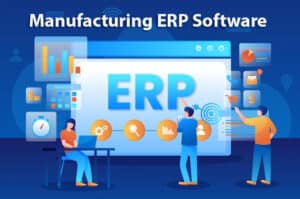news.metroandalas.co.id | Manufacturing ERP Software is a powerful and specialized tool designed to meet the unique needs of manufacturing companies. It plays a pivotal role in streamlining operations, enhancing efficiency, and improving overall productivity within the manufacturing sector. In this article, we will delve into a comprehensive understanding of manufacturing ERP software, exploring its purpose, key features, benefits, and its significance in the modern manufacturing landscape.
1. Introduction to Manufacturing ERP Software

Manufacturing ERP software is a comprehensive business management solution designed specifically for manufacturing companies. It acts as a central hub that integrates various business processes and functions, enabling manufacturers to efficiently plan, execute, and monitor their operations.
2. Key Components and Functions
Production Planning and Scheduling
ERP software assists manufacturers in creating production schedules, optimizing resource allocation, and ensuring the timely production of goods to meet market demands.
Inventory Management
Efficiently managing raw materials, work-in-progress (WIP), and finished goods inventory is crucial. ERP software provides real-time visibility into inventory levels and automates replenishment processes.
Quality Control
Maintaining product quality is a top priority in manufacturing. ERP systems incorporate quality control features to ensure products meet or exceed industry standards.
Supply Chain Management
ERP software helps manage supplier relationships, procurement processes, and supply chain logistics. This includes monitoring supplier performance and lead times.
Financial Management
Manufacturing ERP solutions encompass financial modules to manage accounting, budgeting, cost tracking, and financial reporting.
3. How Manufacturing ERP Works
ERP software collects data from various sources, processes it in real-time, and presents it through user-friendly interfaces and dashboards. This data-driven approach empowers manufacturers to monitor operations, analyze trends, and make informed decisions.
4. Benefits of Implementing Manufacturing ERP Software
Enhanced Efficiency
ERP systems optimize workflows, automate tasks, and reduce manual data entry, resulting in increased operational efficiency.
Improved Resource Management
Manufacturers can effectively allocate resources, such as labor, machinery, and materials, based on real-time data and demand forecasts.
Accurate Financial Control
ERP software ensures accurate financial data, helping businesses manage costs, budgets, and financial reporting with precision.
Enhanced Decision-Making
Real-time data and analytics empower manufacturers to make informed decisions promptly, improving overall productivity and adaptability.
Compliance and Quality Assurance
Manufacturing ERP software aids in compliance with industry regulations and quality standards, reducing the risk of errors and recalls.
5. Challenges in Implementing Manufacturing ERP
Implementing ERP software can be challenging, including initial costs, employee resistance to change, and the need for comprehensive training.
6. Selecting the Right Manufacturing ERP Software
Choosing the right ERP software involves assessing business needs, evaluating vendors, and considering customization options and scalability.
7. Implementation and Training
Proper implementation and training are crucial for maximizing the benefits of manufacturing ERP software. This includes data migration, system configuration, and staff training.
8. Future Trends in Manufacturing ERP Software
The future of manufacturing ERP software is marked by advancements in technology, including IoT, AI, and augmented reality, which will further enhance automation, data analysis, and decision-making.
9. Conclusion
Manufacturing ERP software is indispensable for modern manufacturing operations. Its ability to optimize processes, reduce costs, enhance quality control, and provide real-time insights makes it an invaluable tool for manufacturers striving to stay competitive in the global marketplace. By selecting the right software and effectively implementing it, businesses can unlock new levels of efficiency, quality, and competitiveness in their industry.
Manufacturing ERP (Enterprise Resource Planning) software is a specialized solution designed to streamline and optimize the various processes and operations within manufacturing companies. It serves as a central platform for managing and integrating all aspects of manufacturing, including production, inventory, supply chain, quality control, and more. Here are the key features and functionalities typically found in manufacturing ERP software:
- Production Planning and Scheduling:
Create production schedules based on demand forecasts and resource availability.
Optimize production workflows to minimize downtime and maximize efficiency. - Inventory Management:
Track raw materials, work-in-progress (WIP), and finished goods inventory.
Implement just-in-time (JIT) inventory practices to reduce carrying costs. - Bill of Materials (BOM) Management:
Create and manage BOMs for products, specifying the required components and their quantities.
Ensure accurate and consistent product assembly. - Quality Control and Assurance:
Implement quality control processes and standards to ensure product quality.
Conduct inspections, tests, and audits to maintain quality standards. - Supply Chain Management:
Manage supplier relationships, procurement, and supplier performance.
Monitor supplier lead times and ensure timely deliveries. - Machine and Equipment Monitoring:
Track the performance and condition of manufacturing machinery and equipment.
Predictive maintenance to reduce downtime and maintenance costs. - Resource Allocation and Capacity Planning:
Optimize the allocation of resources, including labor and machinery.
Plan for future capacity requirements. - Cost Management:
Monitor production costs, including materials, labor, and overhead.
Analyze cost variances and identify cost-saving opportunities. - Shop Floor Control:
Manage and monitor activities on the shop floor in real-time.
Capture data on work orders, production progress, and employee performance. - Real-time Data Analysis and Reporting:
Generate real-time reports and dashboards for visibility into manufacturing operations.
Analyze data to make informed decisions and identify areas for improvement. - Compliance and Regulatory Support:
Ensure compliance with industry-specific regulations and quality standards.
Maintain documentation and audit trails for compliance purposes. - Scalability:
Adapt the ERP system to accommodate changes in production volume and business growth.
Integration with Other Systems:
Seamlessly integrate with other business systems, such as financial software, CRM, and e-commerce platforms. - Cloud-Based Access:
Many modern manufacturing ERP solutions offer cloud-based access for remote monitoring and management.
User-friendly Interface:
Provide an intuitive and user-friendly interface for easy adoption by employees.
Manufacturing ERP Software helps companies improve operational efficiency, reduce costs, enhance product quality, and respond quickly to market demands. It plays a crucial role in modern manufacturing, where competitiveness and agility are paramount. The choice of manufacturing ERP software should align with the specific needs, size, and industry of the manufacturing business.
[hurrytimer id=”120″]